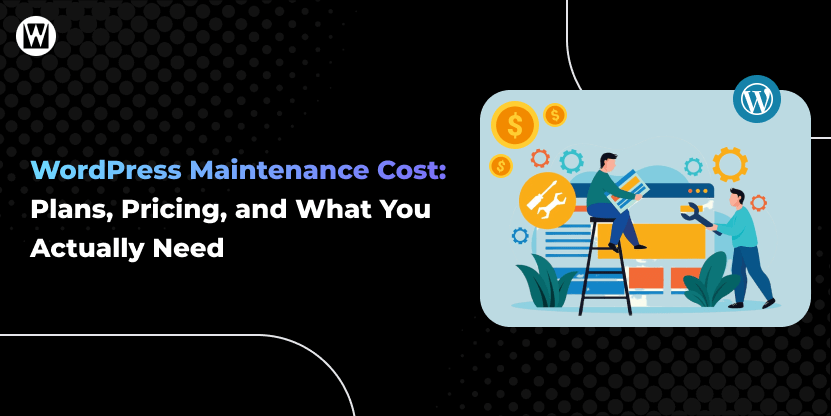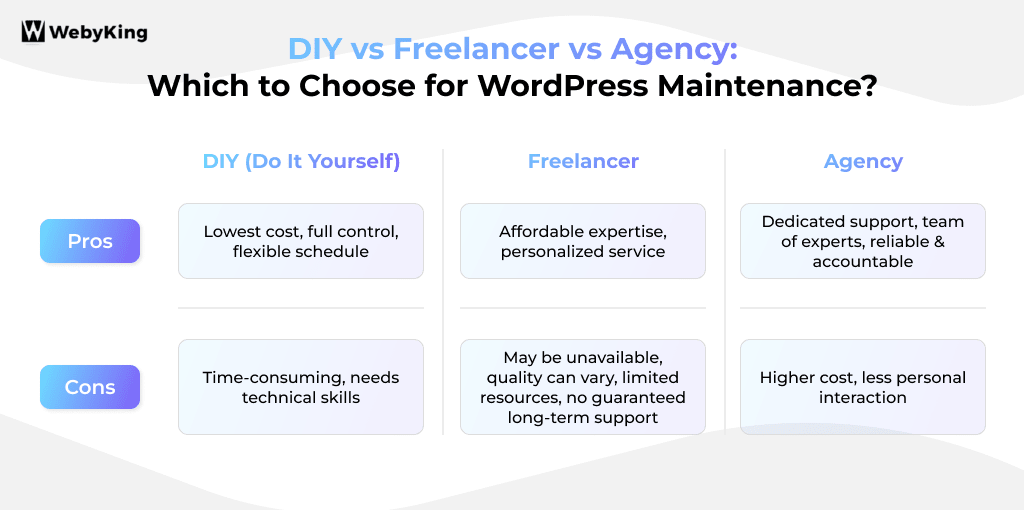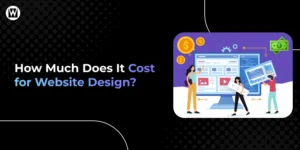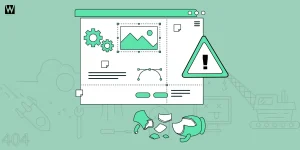WordPress Maintenance Cost: Plans, Pricing, and What You Actually Need

WordPress is one of the most popular platforms for building websites. But while it’s user-friendly and flexible, many website owners don’t realize how important – and sometimes costly – it is to keep a WordPress site updated and running smoothly.
Before we delve into the various maintenance packages and pricing options, it’s worthwhile to explore what might happen if you don’t have any kind of maintenance plan at all.
What Happens If You Don’t Maintain Your WordPress Website?
Some people see maintenance as just another line item they can cut from their budget. But neglecting your WordPress website’s upkeep can lead to bigger problems – ones that cost much more than any maintenance plan.
Here’s what you risk without regular care:
- Security issues: Sites that aren’t updated are an easy target for hackers. A breach can lead to stolen data, blacklisted websites, and expensive cleanups.
- Downtime: Without proper monitoring, your website may crash or go offline without you even noticing, resulting in lost visitors, leads, and sales.
- Sluggish Performance: Broken features and slow-loading pages frustrate users and push your site down in search results.
- Incompatibility: Plugins and themes change over time. If your site isn’t updated regularly, things may stop working suddenly.
- Lost Data: No regular backups? One wrong move or malicious attack could wipe out your site’s content and customer data.
- Compliance & Legal Risks: Poor security or outdated software can lead to breaches, legal penalties, and loss of customer trust.
- Damaged Brand Reputation: A hacked or broken site makes your business look unreliable and drives visitors away.
- Higher Fix Costs: The longer you delay maintenance, the more expensive and complex it becomes to fix problems.
- Missed Growth Opportunities: Skipping updates means losing access to new features, integrations, and performance improvements.
These consequences can harm your business’s finances and reputation. Investing in regular maintenance is not just about avoiding problems – it’s about keeping your site reliable, fast, and secure.
Don’t wait until hackers strike or your site goes down. Our WordPress maintenance plans safeguard your site from hacks, downtime, and data loss — keeping your business protected 24/7.
What Does WordPress Maintenance Include?

Ongoing WordPress maintenance involves a range of tasks to keep your site in top shape. Let’s break down the essential jobs that should be done consistently.
Updates (WordPress Core, Plugins, Themes)
- Keep WordPress software, plugins, and themes current.
- Updates fix bugs, improve features, and most importantly, patch security holes.
- Help your site work smoothly with the latest web tech and browser versions.
Security Protection
- Install a trusted security plugin and configure it properly.
- Use strong passwords and two-factor authentication.
- Regular malware scans and security checks.
- Keep your SSL certificate active.
- Monitor login attempts and other suspicious behavior.
Backups
- Regularly back up your entire site – both files and database.
- Store backups in multiple places, like the cloud and locally.
- Test that your backups can be restored.
- Set up automatic backups on a schedule (daily, weekly, etc.)
Speed & Performance
- Optimize images to reduce load time.
- Minify CSS, JavaScript, and HTML files.
- Use caching tools to make your site faster.
- Clean up old or unnecessary database entries.
- Check for broken links and fix them.
- Monitor your site’s loading speed and overall performance.
Every one of these tasks plays a role in keeping your website secure, fast, and reliable. While some need to be done weekly, others may be monthly or quarterly, but none should be ignored.
What Are the Key Factors That Decide the Cost of WordPress Maintenance?
The cost of maintaining a WordPress site can vary, from a small monthly fee to several hundred dollars, depending on your website size, traffic, and required support. Here are the main factors that impact your website maintenance cost per month or per year:
Website Size and Complexity
- More pages = more updates, checks, and time.
- If your site has custom features or advanced functionality, it usually needs more attention.
- Online stores often require added security and regular updates to payment systems.
Cost Impact: Bigger, more advanced sites usually cost more to maintain.
Website Traffic
- High-traffic websites need better hosting, tighter security, and faster performance.
- More visitors mean more things can go wrong – and more to monitor.
Cost impact: More traffic = higher need for optimization and security = higher maintenance costs.
Number of Plugins and Themes
- Each plugin and theme needs its updates.
- The more you have, the greater the chance of something going wrong.
- Premium plugins often need annual license renewal.
Cost impact: More plugins = more upkeep = more potential for issues, higher cost.
Custom Features and Tools
- Custom-coded features require custom maintenance.
- Integrations with outside tools (like CRMs or payment platforms) need to be tested regularly.
- Some updates may cause custom features to stop working.
Cost impact: The more customized your site is, the more it’ll cost to maintain properly.
Security Needs
- Higher levels of security monitoring mean extra tools, firewalls, and constant checks.
- Websites handling sensitive data (like customer info or payments) need stronger protection.
- Extra backups, malware scans, and intrusion detection all add to the workload.
Cost impact: More security = more monitoring = higher ongoing maintenance costs.
Frequency of Updates
- Sites that regularly add new content or features need constant maintenance.
- Every update increases the chance of conflicts or broken elements.
- Frequent changes require more testing and optimization to keep things running smoothly.
Cost impact: The more often your site changes, the more maintenance is needed – and the higher the cost.
Support Level
- Some businesses only need basic support during business hours.
- Others require 24/7 emergency support with guaranteed response times.
- Premium support services come at a higher price because they need dedicated staff on call.
Cost impact: Standard support = lower cost; round-the-clock emergency support = premium pricing.
Legal or Data Compliance Needs (HIPAA, GDPR, etc.)
- Compliance requires strict data handling and security measures.
- Extra documentation, audits, and legal safeguards may be needed.
- Failure to comply can lead to penalties, making proactive compliance essential.
Cost impact: Higher compliance needs = specialized maintenance = higher overall cost.
International Websites
- Serving multiple regions means optimizing for speed across global servers.
- Language translations, currency settings, and regional compliance can add complexity.
- Extra monitoring is required to ensure smooth performance worldwide.
Cost impact: Global reach = more optimization, compliance, and monitoring = higher costs.
Why Monitoring and Uptime Tracking Matter for Your Website?
Your website should always be open for business. If it goes down, you lose visitors, leads, and revenue — sometimes without even knowing it. That’s why monitoring and uptime tracking are critical parts of WordPress maintenance.
Here’s why they matter:
- Catch Issues Instantly: Get alerts the moment your site goes offline so you can fix problems before customers notice.
- Protect User Experience: Consistent uptime and fast performance keep visitors engaged and build trust.
- Safeguard Revenue: For eCommerce or lead-gen sites, even a few minutes of downtime can mean lost sales.
- Boost SEO: Search engines favor sites that are reliable. Frequent downtime can hurt your rankings.
- Peace of Mind: Real-time monitoring means you don’t have to constantly check if your site is running — you’ll know it is.
Monitoring and uptime tracking protect your business from lost revenue, poor SEO, and damaged reputation. They’re not optional — they’re essential.
Not every update or plugin should cost a fortune. WebyKing helps you cut unnecessary expenses and keep your site running fast, secure, and fully optimized — for less.
How Much Do WordPress Maintenance Plans Cost?
Typically, the WordPress website maintenance cost ranges from $1,000 to $5,000+ per year, depending on your website complexity and the services included.
For a basic site with occasional updates and security checks, you might only spend around $80–$150/month. But if you’re running a busy eCommerce store or need ongoing development and support, expect costs to go higher.
Investing in regular maintenance keeps your site secure, fast, and functioning smoothly. It’s not just about fixing problems — it’s about preventing them. Think of it as insurance for your online presence. Skimping here could cost you more in lost traffic or downtime.
Basic Maintenance Package
Cost: $30-$75/ month
Basic maintenance is ideal for small business websites or blogs that don’t require extensive upkeep. These packages ensure your site remains secure and functional, offering the essential services:
- Core Updates: Ensures your WordPress installation stays current with the latest version, preventing compatibility issues.
- Theme & Plugin Updates: Keeps themes and plugins up to date, reducing vulnerabilities and ensuring seamless performance.
- Security Monitoring: Provides fundamental protection against potential threats and vulnerabilities.
- Regular Backups: Scheduled backups to safeguard your site’s data.
- Performance Checks: Periodic assessments to maintain efficient load times and prevent slowdowns.
Basic plans are designed for sites with moderate traffic and minimal functionality needs.
Intermediate Maintenance Packages
Cost: $75- $150/month
For websites that have more traffic or require more frequent updates, intermediate maintenance packages offer a wider array of services. These are perfect for growing businesses or dynamic sites that need additional attention to performance and security.
- Enhanced Security: Includes malware scanning, firewall setup, and other proactive security measures.
- Performance Optimization: Regular improvements to website speed, database optimization, and overall measurement of performance.
- SEO Maintenance: Basic SEO upkeep, like fixing broken links and ensuring ongoing SEO best practices.
- Content Updates: Assistance with updating website content, whether it’s blog posts or product descriptions.
- Monthly Reports: Detailed reports summarizing updates, security checks, and performance metrics.
Intermediate plans are great for businesses that need consistent updates and enhanced security.
Advanced / Premium Maintenance Packages
Cost: $150-$500+ / month
Premium maintenance plans provide the highest level of support and are tailored for large, high-traffic websites, especially eCommerce sites. These plans cover all aspects of site management, offering comprehensive services for top-tier website performance and security.
- Custom Development: Access to the developer hours for custom features, fixes, and performance enhancements.
- Advanced Security: Includes features like DDoS protection, advanced malware removal, and routine security audits.
- Uptime Monitoring: Real-time monitoring to ensure your site’s always accessible and responsive.
- Staging Environment: A safe testing ground for changes before they go live, ensuring no disruptions occur.
- Priority Support: Faster response time, dedicated account managers, and top-tier customer service.
- Comprehensive Analytics: In-depth insights into website performance, user behavior, and overall website health.
Premium plans cater to businesses with large, complex websites that demand constant optimization and the best available support.
DIY vs Freelancer vs Agency: What Should You Choose?

Choosing how to maintain your WordPress site depends on your budget, time, and technical confidence. Each approach – DIY, hiring a freelancer, or partnering with an agency – comes with its advantages and trade-offs. Here’s a breakdown to help you decide what fits best.
DIY (Do It Yourself)
If you’re technically inclined and prefer having full control, managing your WordPress maintenance can be a viable option. It is most suitable for small websites, personal blogs, or those in the early stages of growth.
Pros
- Cost-saving: You only pay for your hosting, themes, and plugins – no added service fees, making it ideal for tight budgets.
- Full Control: You’re in charge of every update, change, and decision. This gives you a deeper understanding of how your website works.
- Flexible Schedule: You can perform updates and changes whenever it suits you, without relying on someone else’s availability.
Cons
- Time Intensive: Website maintenance isn’t a one-time task. From security monitoring to plugin updates, it demands consistent attention.
- Requires Technical Know-how: If something breaks, you’re responsible for fixing it. Without technical details, even a small issue can escalate quickly.
Hiring a Freelancer
A freelancer is a great in-between solution if you need expert help but aren’t ready to invest in an agency. This is ideal for a small business owner or a growing website that needs occasional or ongoing support.
Pros
- Affordable Expertise: Freelancers often charge less than agencies but still bring solid skills and experience to the table.
- Personalized Service: You’re usually working one-on-one with the freelancer, which allows for more personalized support and direct communication.
- Flexibility: You can hire freelancers for specific tasks or ongoing monthly maintenance – whatever suits your current needs.
Cons
- Inconsistent Availability: A freelancer may not always be available immediately, especially if they’re juggling multiple clients.
- Varied Quality: The freelancer market is vast. Without proper vetting, you might end up with someone who lacks the skills or reliability you need.
Working with An Agency
For high-traffic websites, eCommerce businesses, or companies that rely heavily on their online presence, partnering with a WordPress Development agency offers the most robust solution.
Pros
- Dedicated Support: A professional WordPress maintenance company typically offers full-service maintenance, including updates, backups, security, performance tuning, and even custom development.
- Team of Specialists: You gain access to a team with diverse expertise – developers, designers, marketers – who can handle everything from troubleshooting to strategy.
- Reliability and Accountability: Agencies operate with service-level agreements and structured support processes, providing peace of mind and consistent results.
Cons
- Higher Cost: The level of service comes with a premium price tag, which may not be justifiable for smaller or simpler ties.
- Less Personal Interaction: Working with a team means you might not always speak to the same person, which can feel less personal compared to freelancing.
You Can Also Read: The Ultimate Website Maintenance Checklist
How to Choose the Right WordPress Maintenance Plan
Choosing the right WordPress maintenance plan is important for keeping your website secure, performing well, and up-to-date. The right plan depends on your site’s size, complexity, and specific needs. Here’s a guide to help you choose the best maintenance for your website.
Assess the Size and Complexity of Your Website
Before choosing a maintenance plan, evaluate the scale and intricacy of your website. Smaller blogs or personal websites may not need as much support as large eCommerce platforms or business sites with custom functionality.
- Small websites or blogs: A basic plan should suffice, offering core updates, backups, and security monitoring.
- Medium to large websites: If your site has more pages, products, or custom features, you may need an intermediate plan with added performance optimization and SEO maintenance.
- High-traffic or eCommerce sites: Consider an advanced or premium plan with custom development, real-time uptime monitoring, and in-depth analytics.
Consider Your Budget
Your budget is a key factor in deciding the maintenance plan. While basic plans are affordable, advanced options offer greater value for high-demand websites. Balance your website’s needs with what you’re able to invest in monthly maintenance.
- Limited budget: Opt for a basic plan to get essential services without overspending.
- Mid-range budget: Choose an intermediate plan for more comprehensive service and support.
- Larger budget: If you need top-tier services like custom development and proactive security, an advanced plan will provide long-term benefits.
Evaluate Your Time and Resources
Managing a website requires ongoing attention. If you have the time and technical expertise to handle updates and monitoring yourself, a DIY approach or basic plan may work. However, if you’re too busy or lack technical knowledge, outsourcing your website maintenance is a better option.
- Limited Time or Expertise: Consider a freelancer or agency plan to ensure expert handling of your site’s maintenance.
- Available Time and Basic Skills: A DIY approach or basic plan should work well for simple upkeep tasks like plugin updates and backups.
Think About Security Needs
Security is an ongoing concern for WordPress websites. If your site deals with sensitive information or has a history of security issues, it’s important to prioritize plans that offer enhanced protection.
- Basic Security: A basic plan will cover essential updates and monitoring.
- Comprehensive Security: Opt for an intermediate or advanced plan if you need malware scanning, firewall setup, or vulnerability patching.
Consider the Frequency of Updates and Changes
Think about how often you update content, add new products, or make changes to your site. More frequent updates or complex changes require more robust maintenance support.
- Occasional Changes: If you update content infrequently, a basic plan will be monthly or quarterly updates will be sufficient.
- Regular Changes or New Features: A premium plan offers custom development and faster turnaround times for ongoing updates.
Understand Support and Responsiveness
The quality and speed of customer support are crucial when choosing a maintenance plan. If you need quick responses and expert troubleshooting, look for plans that provide prior support or direct access to a dedicated team.
- Fast Support: An agency or premium freelancer plan will offer priority support and faster resolution times.
- Occasional Support: For less urgent needs, a basic or intermediate plan with standard support might be sufficient.
By evaluating these factors – your site’s complexity, budget, time, security needs, and support requirements – you’ll be able to select the right WordPress maintenance plan that aligns with your business goals and ensures your website stays in top shape.
You Can Also Read: How to Choose the Best Website Maintenance Provider
Tips to Reduce WordPress Maintenance Cost
Keeping your WordPress site running smoothly doesn’t have to break the bank. With a few smart strategies, you can lower ongoing maintenance costs without compromising on quality or performance.
Choose a Well-Coded Theme
A high-quality theme reduces the chances of bugs, compatibility issues, and performance slowdowns, which can lead to fewer maintenance headaches down the line.
Limit Unnecessary Plugins
Only use essential plugins for your site’s functionality. Fewer plugins mean fewer updates, less risk of conflicts, and reduced chances of security vulnerabilities.
Automate Routine Tasks
Use tools to automate backups, updates, and security scans. Automation saves time and minimizes the need for manual intervention or paid help for basic tasks.
Bundle Services Through Website Maintenance Packages
Opting for bundled website maintenance packages can often be more cost-effective than hiring separate services for security, updates, and backups.
Perform Regular Cleanup
Clear out unused themes, plugins, and old content. A leaner website is easier and cost-effective to manage, especially when it comes to performance and security upkeep.
From performance monitoring to long-term support, WebyKing helps you scale confidently. Let’s build a secure, high-performing website that grows with your business.
Final Thoughts
Today, website maintenance isn’t optional – it’s a critical part of your business’s growth engine. From performance and security to SEO and user experience, everything hinges on how well your site is maintained.
As your business scales, your website should evolve just as strategically. At WebyKing, we partner with ambitious brands to turn their websites into high-performing assets – optimized for speed, visibility, and long-term success, all without draining your budget.
Contact us today to explore our WordPress maintenance plans and protect your website’s future with us.
FAQs on WordPress Maintenance Cost
How much does WordPress Maintenance cost per Month?
Monthly WordPress maintenance costs typically range from $30 to $500+, depending on your website’s size, complexity, and required support. Basic plans cover updates, backups, and security checks, while advanced plans may include custom development, performance optimization, SEO support, and real-time monitoring.
Is it necessary to pay for WordPress maintenance if I can update things myself?
If you have the time and technical know-how, you can manage basic maintenance yourself. However, paid plans offer peace of mind by handling ongoing tasks like security monitoring, performance optimization, and troubleshooting, especially valuable for business or high-traffic websites.
What’s included in a typical website maintenance package?
Most website maintenance packages include core updates, plugin and theme updates, regular backups, basic security checks, and performance monitoring. Higher-tier plans may also offer SEO support, uptime monitoring, and dedicated development hours.
How can I find affordable WordPress maintenance options?
Neglecting maintenance can lead to security breaches, slower performance, outdated software, and even website downtime. Over time, these issues can damage your brand’s credibility and lead to higher costs for emergency fixes.
Is it better to hire a freelancer or an agency for WordPress maintenance?
Freelancers are typically more affordable but may miss deadlines and lack the broad expertise needed for complex projects.
Agencies provide detailed, scalable services with multiple skill sets under one roof.
For growing businesses seeking consistent support and guaranteed reliability, agencies are the superior choice.
How Emergency Support Can Save Your Website (and Money)?
Emergency support ensures quick fixes for unexpected website issues, minimizing downtime and protecting revenue. It prevents small problems from escalating into costly outages or security breaches. While it has an upfront cost, it’s a smart investment that keeps your site and business safe.
How Much to Budget for WordPress Maintenance Each Month?
Monthly maintenance costs vary based on your site’s size, complexity, and needs. Basic sites may cost $80–$150/month, while high-traffic or WooCommerce sites often fall into $150–$500+/month for full updates, security, backups, and performance support.
Why do you need a WordPress maintenance plan?
A WordPress maintenance plan keeps your website secure, fast, and reliable. Regular updates, backups, and performance checks prevent downtime, protect against hacks, and ensure your site continues to function smoothly — saving you time, money, and stress in the long run.
Where can I find affordable WordPress website maintenance services?
Affordable WordPress maintenance services are available through trusted agencies, freelance developers, and bundled maintenance packages. Look for providers that offer essential services like updates, backups, and security monitoring at transparent pricing — without compromising quality or reliability.
What are the best WordPress maintenance packages available?
The best WordPress maintenance packages balance security, performance, and cost. Top plans typically include regular updates, automated backups, malware protection, uptime monitoring, and optional extras like SEO maintenance or custom development — ensuring your site stays optimized and safe.
Can someone handle my WordPress website maintenance for me?
Yes. Professional agencies or experienced freelancers can manage your WordPress website for you, taking care of updates, security, backups, and performance optimization. Hiring an expert ensures your site runs smoothly without you needing technical know-how or spending hours on maintenance tasks.
Ravi Makhija, the visionary Founder and CEO of WebyKing, is a seasoned digital marketing strategist and web technology expert with over a decade of experience. Under his leadership, WebyKing has evolved into a premier full service web and marketing agency, delivering innovative solutions that drive online success. Ravi’s deep understanding of the digital landscape combined with his passion for cutting-edge technologies empowers him to consistently exceed client expectations and deliver results that matter.















